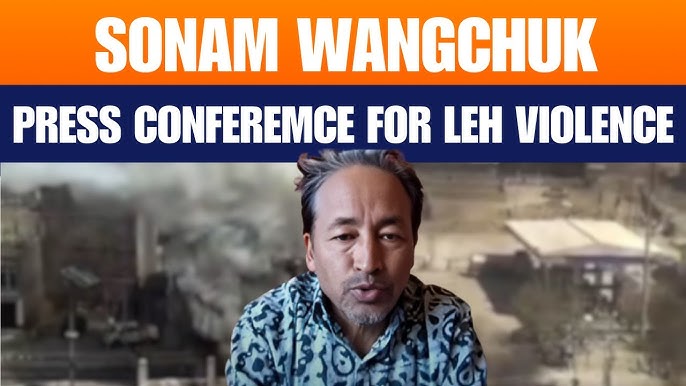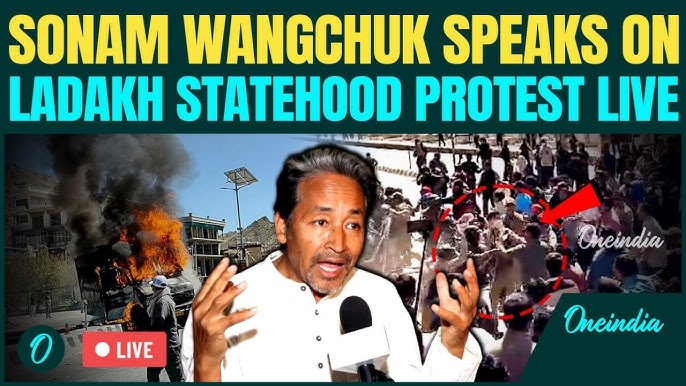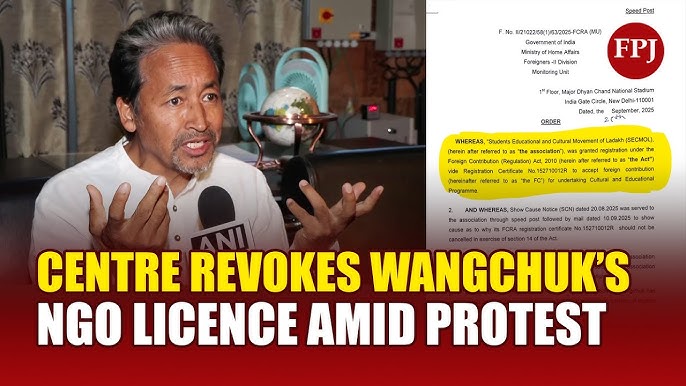The recent decision by the Centre to cancel Sonam Wangchuk's FCRA license has sparked a wave of debate and discussion. This move has significant implications for the work of Wangchuk, a renowned engineer and educator, and his efforts to promote sustainable development in the Ladakh region.
At the heart of this controversy is the question of what prompted the Centre to take such a step. Wangchuk's response to the decision provides valuable insight into the context and motivations behind the move. By examining his statement, it becomes clear that there are deeper issues at play, including the role of foreign funding in supporting social and environmental initiatives.
Some of the key aspects of this situation include:
- The background and history of Wangchuk's work in Ladakh, including his efforts to promote education and sustainable development
- The significance of the FCRA license and its importance for organizations receiving foreign funding
- The potential implications of the Centre's decision for Wangchuk's work and the broader social and environmental landscape of the region
Wangchuk's response to the Centre's decision also highlights the need for a nuanced understanding of the complex issues involved. By exploring the context and implications of this move, it is possible to gain a deeper understanding of the challenges and opportunities facing social and environmental initiatives in India.
The cancellation of Wangchuk's FCRA license is not an isolated incident, but rather part of a larger trend of increased scrutiny and regulation of foreign funding for social and environmental organizations. As such, it is essential to consider the broader implications of this decision and its potential impact on the work of other organizations and individuals in the sector.

Background on Sonam Wangchuk and FCRA
Sonam Wangchuk is an Indian engineer, innovator, and education reformist. He is best known for his work in the field of education and innovation, and has been recognized for his contributions through various awards and honors. Wangchuk's work focuses on creating sustainable and innovative solutions to real-world problems, and he has been instrumental in promoting education and development in rural India.
The Foreign Contribution (Regulation) Act, 2010 (FCRA) is a law that regulates the acceptance and utilization of foreign contributions by individuals, associations, and companies in India. This law is designed to ensure that foreign contributions are used for legitimate purposes and do not compromise the country's sovereignty or national interests. The FCRA requires individuals and organizations to register with the government before accepting foreign contributions, and also imposes restrictions on the use of such contributions.
Key features of the FCRA include:
- Regulation of foreign contributions: The FCRA regulates the acceptance and utilization of foreign contributions by individuals, associations, and companies in India.
- Registration requirement: Individuals and organizations must register with the government before accepting foreign contributions.
- Restrictions on use: The FCRA imposes restrictions on the use of foreign contributions, ensuring that they are used for legitimate purposes.
- Transparency and accountability: The FCRA promotes transparency and accountability in the use of foreign contributions, requiring individuals and organizations to file annual returns and maintain proper accounts.
The FCRA has significant implications for individuals and organizations in India, including those involved in education and social development. Sonam Wangchuk's work, for example, may involve accepting foreign contributions to support his education and innovation initiatives. In such cases, compliance with the FCRA is essential to ensure that the contributions are used for legitimate purposes and do not compromise the country's sovereignty or national interests. By understanding the provisions of the FCRA, individuals and organizations can ensure that they are using foreign contributions in a responsible and transparent manner.

The Centre's Move to Cancel FCRA License
The decision to cancel the FCRA license of Sonam Wangchuk's organization has sent shockwaves across the country. This move by the Centre has been met with widespread criticism, with many questioning the reasons behind such a drastic step. The lack of transparency in disclosing the reasons for cancellation has only added to the confusion and skepticism.
The FCRA license is crucial for organizations that rely on foreign funding to carry out their activities. The cancellation of this license can have severe implications for the functioning of such organizations, making it difficult for them to receive funds from abroad. In the case of Sonam Wangchuk's organization, the cancellation of the FCRA license can significantly impact their ability to carry out their work.
The reasons for the cancellation of the FCRA license have not been publicly disclosed, leading to speculation and rumors. Some of the possible reasons that have been cited include:
- Alleged violation of FCRA norms
- Non-compliance with regulatory requirements
- Activities that are deemed to be against the national interest
However, without official confirmation, it is difficult to ascertain the exact reasons behind the cancellation.
The move to cancel the FCRA license has been viewed by many as an attack on dissenting voices. Sonam Wangchuk's organization has been vocal on various issues, and the cancellation of the FCRA license is seen as a way to muzzle their voice. This has led to criticism from various quarters, with many arguing that the move is an attempt to stifle dissent and free speech.
The implications of this move go beyond the organization itself, as it can have a chilling effect on other organizations and individuals who may be critical of the government. The lack of transparency and accountability in the cancellation of the FCRA license has raised concerns about the state of democracy and the freedom of speech in the country. As the debate continues, it remains to be seen how this move will impact the functioning of organizations that rely on foreign funding and the overall state of free speech in the country.

Sonam Wangchuk's Response and Implications
Sonam Wangchuk has recently spoken out against the Centre's decision, describing it as an action that is part of a political witch hunt. This response suggests that Wangchuk believes the move is motivated by political considerations rather than a genuine concern for the organization's activities.
The cancellation of the FCRA license is a significant development that could have far-reaching consequences. The main implications of this move are related to the organization's ability to receive foreign funding.
Some of the key implications of the cancellation of the FCRA license include:
- Restrictions on foreign funding: The organization will no longer be able to receive funds from foreign sources, which could severely impact its operations and projects.
- Limitations on international collaborations: The cancellation of the FCRA license may also limit the organization's ability to collaborate with international partners and organizations.
- Impact on ongoing projects: The loss of foreign funding could have a significant impact on the organization's ongoing projects, which may have to be scaled back or cancelled altogether.
The response from Sonam Wangchuk and the implications of the FCRA license cancellation highlight the complexities and challenges faced by organizations that rely on foreign funding. The situation is likely to have significant repercussions for the organization and its activities, and it will be important to monitor developments in the coming months.
Overall, the cancellation of the FCRA license and Sonam Wangchuk's response to it are significant developments that have important implications for the organization and its ability to operate effectively. The situation underscores the need for transparency and accountability in the use of foreign funding, as well as the importance of protecting the rights and interests of organizations that rely on such funding.

Reactions and Fallout
The cancellation of Sonam Wangchuk's FCRA license has sent shockwaves across the country, with many expressing outrage and disappointment over the Centre's decision. This move has sparked a heated debate, with several prominent figures and organizations questioning the motives behind the cancellation. The FCRA license is crucial for non-governmental organizations (NGOs) to receive foreign funding, and its cancellation can have severe implications for their operations.
At the heart of the controversy is the perceived attempt to stifle dissenting voices and restrict freedom of speech. Many believe that the cancellation of Sonam Wangchuk's FCRA license is a deliberate attempt to silence him and other like-minded individuals who have been critical of the government's policies. This has led to widespread concern about the potential consequences of such a move, including its impact on the overall democratic fabric of the country.
Some of the potential consequences of the cancellation of Sonam Wangchuk's FCRA license include:
- Restrictions on foreign funding for NGOs, which can severely limit their ability to operate effectively
- A chilling effect on free speech and dissent, as individuals and organizations may become increasingly cautious about expressing their opinions or criticizing the government
- A negative impact on the country's reputation as a democratic and tolerant society, which can have far-reaching implications for its global standing and relationships with other countries
The move is likely to have far-reaching consequences, extending beyond the immediate impact on Sonam Wangchuk and his organization. It can create a sense of fear and uncertainty among NGOs and individuals who rely on foreign funding, leading to a decline in their ability to engage in critical work and advocate for social and environmental causes. This, in turn, can have a profound impact on the country's social and economic development, as well as its overall well-being.
The debate surrounding the cancellation of Sonam Wangchuk's FCRA license has also raised important questions about the role of the government in regulating NGOs and ensuring transparency and accountability. While the government has a legitimate interest in ensuring that foreign funding is not misused, it is equally important to ensure that such regulations do not stifle free speech and dissent. The need for a balanced approach that protects the rights of NGOs and individuals while also ensuring accountability and transparency is critical in this context.

Frequently Asked Questions (FAQ)
What is the FCRA license and why is it important?
The FCRA license is a crucial permit that allows individuals and organizations in India to receive foreign contributions, which can be used for various purposes, including social and charitable work. This license is issued by the Ministry of Home Affairs, Government of India, and is essential for any entity that wants to accept donations or funds from foreign sources.
The main objective of the FCRA license is to regulate the flow of foreign funds into India and ensure that these funds are used for legitimate purposes. The license is granted to organizations that are involved in social, cultural, economic, and educational activities, and are registered under the Foreign Contribution (Regulation) Act, 2010.
To be eligible for an FCRA license, an organization must meet certain criteria, including:
- Being registered under the Societies Registration Act, 1860, or the Indian Trusts Act, 1882, or the Companies Act, 2013
- Having a clear objective of promoting social, cultural, economic, or educational activities
- Not being involved in any activities that are detrimental to the national interest
- Having a bank account in a scheduled bank
The FCRA license is important because it allows organizations to access foreign funds, which can be used to support a wide range of activities, such as education, healthcare, and poverty alleviation. It also helps to promote international cooperation and collaboration, and enables Indian organizations to participate in global initiatives and projects.
In addition to allowing organizations to receive foreign contributions, the FCRA license also provides a level of transparency and accountability. Organizations that are granted an FCRA license are required to file annual returns and provide details of their foreign contributions, which helps to ensure that the funds are being used for legitimate purposes. Overall, the FCRA license plays a critical role in regulating the flow of foreign funds into India and promoting social and charitable work.
Why has the Centre cancelled Sonam Wangchuk's FCRA license?
The cancellation of Sonam Wangchuk's FCRA license has sparked widespread concern and debate. The move has been seen as a significant blow to the renowned engineer and educator, who has been a vocal advocate for social and environmental causes.
The exact reasons for the cancellation of Sonam Wangchuk's FCRA license have not been publicly disclosed, but it is believed to be related to his vocal criticism of the government and its policies. This has led to speculation that the cancellation may be a form of retaliation against Wangchuk for his outspoken views.
Some of the possible reasons for the cancellation include:
- Criticism of government policies, particularly those related to the environment and social justice
- Allegations of non-compliance with FCRA regulations, although these have not been officially confirmed
- Concerns about the use of foreign funding for activities that may be deemed political or sensitive
The cancellation of Wangchuk's FCRA license has significant implications for his work and the organizations he is associated with. It may limit his ability to access foreign funding, which could impact his ability to carry out his social and environmental initiatives.
The move has also raised concerns about the freedom of speech and the ability of civil society organizations to operate independently. Many have expressed solidarity with Wangchuk and called for greater transparency and accountability in the decision-making process surrounding the cancellation of his FCRA license.
What are the implications of the cancellation of Sonam Wangchuk's FCRA license?
The cancellation of Sonam Wangchuk's FCRA license has sparked widespread concern and debate. This move could have far-reaching consequences for his organization, potentially jeopardizing its ability to receive foreign funding. As a result, the organization may struggle to continue its operations and implement its projects, ultimately hindering its mission and objectives.
One of the primary implications of the cancellation is the potential loss of foreign funding. Wangchuk's organization relies heavily on foreign donations to support its initiatives, and without the FCRA license, it may no longer be eligible to receive such funds. This could lead to a significant decline in the organization's financial resources, forcing it to scale back its operations or even cease its activities altogether.
The cancellation of the FCRA license could also have a chilling effect on free speech and dissent in India. Wangchuk is a vocal critic of the government, and the move to cancel his license may be seen as an attempt to silence him and intimidate others who dare to speak out against the authorities. This could lead to a climate of fear and self-censorship, where individuals and organizations are reluctant to express their opinions or criticize the government for fear of reprisal.
Some of the key implications of the cancellation of Sonam Wangchuk's FCRA license include:
- Loss of foreign funding, which could lead to a decline in the organization's financial resources and a reduction in its operations
- A chilling effect on free speech and dissent, as individuals and organizations may be reluctant to express their opinions or criticize the government for fear of reprisal
- Potential damage to the organization's reputation and credibility, which could make it harder for it to attract funding and support in the future
- A negative impact on the organization's ability to implement its projects and achieve its objectives, which could have far-reaching consequences for the communities it serves
The cancellation of Wangchuk's FCRA license has also raised questions about the government's motivations and the potential for abuse of power. Many have argued that the move is a clear attempt to silence a vocal critic and intimidate others who dare to speak out against the authorities. This has sparked concerns about the health of India's democracy and the ability of individuals and organizations to express their opinions and criticize the government without fear of reprisal.




